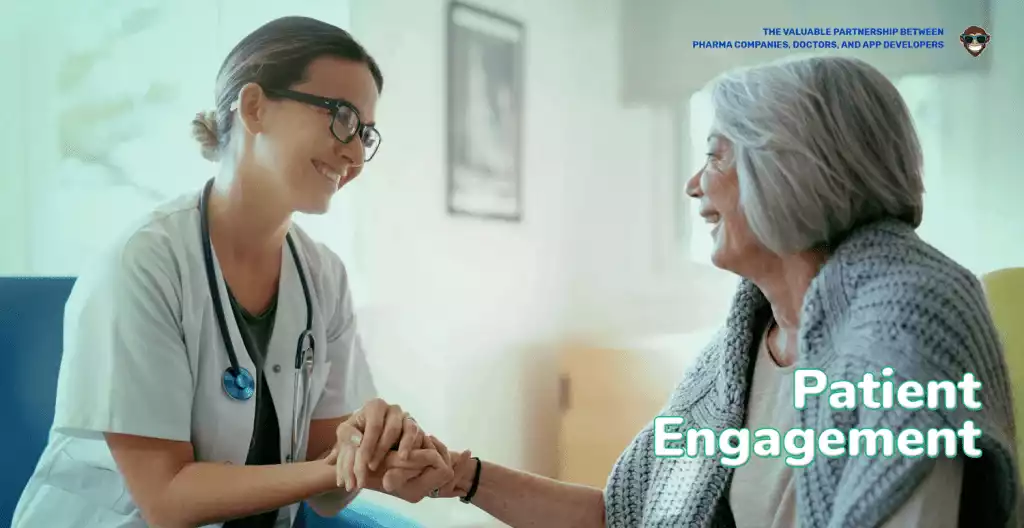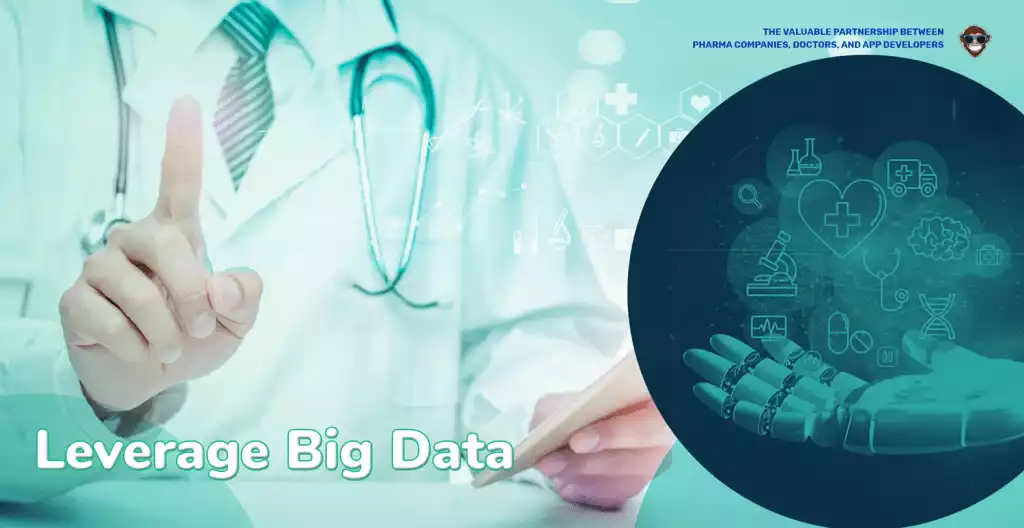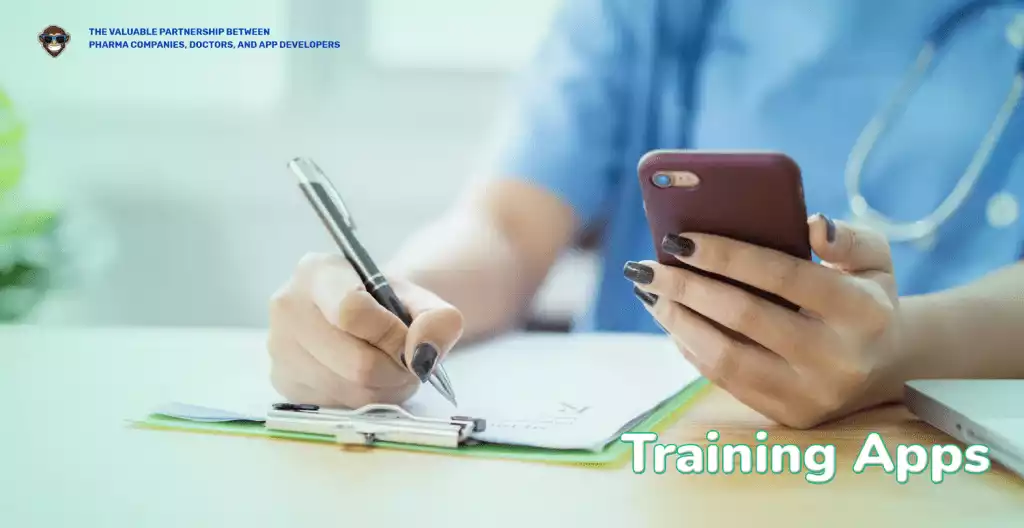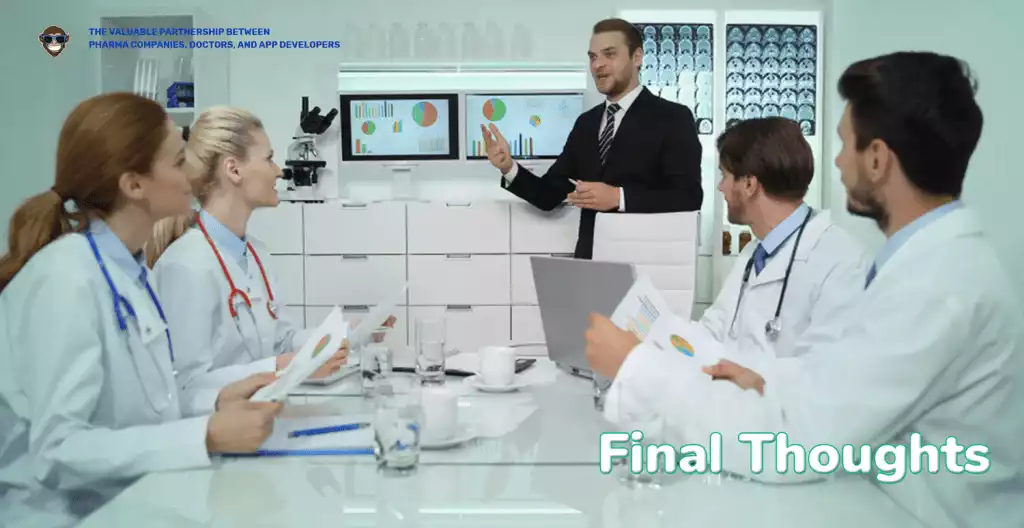Multi-dimensional communication highways between pharma companies, doctors, and healthcare app developers can drive efficiency forward. It can also help deliver high-quality mobile healthcare products and services.

With the exponential rise in smartphone usage and mobile apps, it’s no wonder that healthcare apps are gaining popularity, especially these last few years. The sector has seen a mushrooming of apps directed at patients, doctors, hospitals, and pharma companies to provide a wide range of mobile health services. Consequently, healthcare app developers have become highly sought to propel medical and pharma-focused apps’ growth and availability. Whatever the purpose or target audience, a successful healthcare app provides added value and enables productive and enduring relationships between stakeholders. However, the value of these apps and their successful adoption depends, among other factors, on communication between app developers, doctors, and pharma companies.
Even though most healthcare apps are patient-centered, the relationship between medical and pharma industries has benefited from mobile solutions for the past years, and even more in COVID times. As a result, app developers have birthed a wide range of doctor and pharma-focused apps that have helped improve healthcare delivery outcomes. Furthermore, with pharma and physicians entering the mobile healthcare game, medical app development has become an omnichannel highway of communication. This app diversity, though, comes with some challenges. Hence, we cannot downplay the importance of the relationship between pharma companies and physicians. On this matter, a report by Bryter concluded that 48% of the 1,500 physicians surveyed receive communication from pharma companies through only one channel: sales representatives. These numbers mean that some doctors don’t have a platform to learn and access mobile pharma tools and resources.
Another study concluded that doctors and medical students owned 1 to 5 medical apps for learning, disease diagnosis, and drug reference apps, with doctors favoring calculator apps. This study highlights that physicians are open to using pharma and healthcare apps for learning and accessing tools to deliver better care. Consequently, app developers are responsible for bridging the gap between pharma companies and medical staff by creating mobile products to streamline healthcare processes. While not entirely without challenges, healthcare app development is the gateway for better, more efficient medical care delivery when done correctly. Here are some of the reasons why the relationship between doctors, pharma companies, and app developers is crucial for the mobile healthcare environment.

Healthcare App Developers can Help Doctors and Pharma Companies Communicate Better
As stated above, many pharma companies still only communicate with doctors via sales reps. Not only are pharma companies developing a sales-only relationship with physicians, but physicians are missing out on pharma resources to enrich their performance. Furthermore, patients are reluctant to share their health information directly with pharma companies but will share it with physicians. Consequently, pharma companies need a good rapport with doctors to access patient data. On this matter, a study by Deloitte found that only 32% of surveyed patients trusted apps produced by pharma.
Additionally, 83% said they trusted their doctor to handle their mobile personal data, but only 30% would share their data with a pharma company. On this matter, it’s important to note that data from apps is usually heavily protected, as we do in Foonkie, where patient data is encrypted to protect info on their device and the server. As a result, pharma companies don’t have any access to it. Still, and even though legally speaking, pharma companies don’t have access to patient data from apps, it’s essential to keep in mind the lack of trust users have regarding pharma and data access. Consequently, it is paramount for pharma to seek a digital partnership with doctors to build trusting relationships with their patients. Here’s where having the right communication channels with app developers can create mobile technologies to promote liaisons between parties.
Closer cooperation between pharma, doctors, and developers can also blur the barriers between parties, thus promoting patient engagement with the entire healthcare ecosystem, not just with their direct providers. Developers can help pharma companies deliver mobile solutions to empower patients, push them to take charge of their treatment plans, and promote drug adherence. Also, doctors are increasingly turning to pharma apps to enhance care for their patients by seeking information to diagnose and build treatment plans.
The variety of these communication channels is growing, and now doctors also have apps for educational video content, simulators, apps for commercial purposes, and calculators. These mobile avenues put a wealth of medical data at the doctors’ disposal to ease their workload. Moreover, a digital partnership between developers, doctors, and pharma can tackle problems in the healthcare environment, such as lack of credible medical content, awareness, communication barriers, and poor understanding of drugs.

Developers Help Doctors and Pharma Promote Patient Engagement
One of the most promising uses of healthcare apps is to promote patient engagement, which is still a struggle in some digital healthcare scenarios. Regardless of the type of app, considering the patient as a top-priority needs to be at the crux of any healthcare app development process. Pharma, developers, and doctors need to communicate efficiently to drive mobile engagement forward. This communication helps pharmaceutical companies increase their value for patients’ lives and stop them from seeing pharma as just a medicine seller. Consequently, pharma can build stronger, more trusting relationships with patients by informing them about drug intake, medical recommendations, medication reminders, or tracking treatment processes, among others.
Successful patient engagement also lies in the access they have to trustful technologies and sources of information. Google, for instance, is no longer a trusted source of medical data as patients are becoming more critical of the information they consume. Accordingly, developers and stakeholders need to make informed decisions about the mobile products they deliver and their data integrity. Furthermore, patient engagement also depends on their doctors’ engagement with pharma apps. Often, doctors use pharma apps to access useful resources to share with their patients. They again turn to the pharma industry to ensure access to reliable medical information sources to “prescribe” apps or recommend health-monitoring tools.
Among all, healthcare app developers give doctors and pharma the chance to engage with patients, or among themselves, by creating apps that inform, recommend, teach, and track. These apps promote patient engagement by delivering medical content and up-to-date expert knowledge to include them as participants in their healthcare outcomes. Moreover, these digital engagement channels increase the awareness of stakeholders’ roles in the healthcare delivery system. It also shifts the medical paradigm from a top-to-bottom approach to a multi-level ecosystem where all stakeholders understand and play active parts in medical care delivery.

Healthcare App Developers Can Help Pharma and Medical Organizations Leverage Big Data
Big Data mined from electronic health records (EHR), biometric data, Internet of Things (IoT) devices, and apps, to name a few, is one of the most useful resources to enrich medical research. Big Data can streamline procedures in the pharmaceutical and medical industries and promote efficiency within medical organizations. Hence, the $4.7 billion pharmaceutical companies have invested in Big Data Analytics (BDA). This figure is one of the many reasons Big Data is one of the driving forces that app developers need to insert at the core of their development processes.
App developers can help pharma and doctors use and collect Big Data with apps that enable heart rate monitoring, blood pressure, glucose levels, physical activity, drug adherence, or EHR management. This way, there is a large amount of data that pharma companies and doctors can tap into to understand diseases, study patterns, design specific treatment models, or use as learning mechanisms. Furthermore, these apps, which result from effective communication between stakeholders, allow all healthcare participants to evolve in a pervasive environment where health-related data sharing can improve care delivery.
Additionally, Big Data can enable precision medicine for both pharma and healthcare providers. Pharma companies can gather actionable insights to identify patients’ needs and propel testing, advanced clinical trials, and push innovation in drug research forward. On the other hand, doctors can educate themselves from these pharma resources and have a better, more trusting relationship with their patients. They can deliver medical services that are more in sync with their patients’ needs and ultimately improve their quality of life by adopting the appropriate mobile tools.

Pharmaceutical Reference and Training Apps for Doctors
Doctors are increasingly looking for trusted academic resources they can access easily to improve the quality of the medical care they deliver. This is why today, 85% of physicians use their mobile phones to educate themselves. With the proper app developer and the right communication, pharma companies can take on being health educators. App developers can build the tools to make academic information available for medical students, professionals, and patients alike. As a result, and thanks to mobile technologies, healthcare providers can now easily access academic documents, calculators, Virtual Reality (VR) simulators, trial results, and even virtual conference archives.
Additionally, pharma apps created for doctors can also help them with medication names, interactions, components, and dosage calculators. Even patients can access to learn about their treatments if they so desire. Moreover, these apps make information deliverable in a fast way that is easily accessible, scalable, provides continuous updates, and saves time that doctors can employ in other time-pressing tasks. Learning and reference apps also help physicians meet each patient’s specific needs instead of delivering generic care.
On the other hand, healthcare app developers can also help pharma companies leverage training programs for their employees. These learning apps are beneficial for sales support because they can help medical representatives learn more about their product and be on par with medical knowledge. Having the right informative tools on a mobile device rather than on a desktop at an office can enhance their understanding of the product and improve their sales records. This helps increase profitability margins for pharma companies.
Whether aimed at doctors, patients, or pharma staff, developing an app with learning material, videos, calculators, references, or drug information can empower users to take charge of their training processes. Additionally, these apps can strengthen the relationship between pharma and medical staff, which can benefit healthcare systems’ ultimate goal: improve patients’ quality of life.

Final Thoughts
The increasing relevance of mobile technologies in healthcare has raised awareness about the importance of app developers and healthcare participants’ relationships. This relationship lays the groundwork for efficient, engaging healthcare apps that meet their goals and improve their users’ lives. Moreover, app developers are the facilitators of the mobile tools that could bring about the future of healthcare consultations. Consequently, stakeholders need to communicate their needs, ideas, and issues to their app developers so that the product is as close to perfection as can be. There’s no room for errors in healthcare systems, so communication channels between participants must always be clear and straightforward. As a result, and when done correctly, healthcare apps shift the perception of traditional medical care entirely. They can create a multi-channel approach to healthcare services where all participants can engage in vertical communication, thus pushing medical care forward.
At Foonkie Monkey, we have in-depth experience working with healthcare professionals and pharma companies. We know hot to deliver innovative, efficient, secure, and insightful apps to solve issues like lack of learning platforms, exam requisitions, and patient health monitoring, to name a few. We excel at designing apps that enable our clients to create robust medical care systems to maximize efficiency, profitability, and accessibility to services.
If you’re looking for a development partner with whom you can create a long-lasting relationship to build healthcare products that transcend, let’s have a chat!
